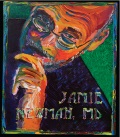Discharge meds
A patient's request presents an ethical dilemma.
Mr. Q was ready for discharge. He had been admitted 3 days ago with an acute exacerbation of chronic systolic congestive heart failure combined with atrial fibrillation with a rapid ventricular rate.
For Dr. M, this was a fairly standard case, admitted by one of his colleagues overnight. With adequate diuresis and beta-blockage, Mr. Q's volume and rate both improved. Dr. M wanted to make it quick and get on to his next admission. He was also feeling pretty annoyed, as this was not the first time he had taken care of Mr. Q. He sat down with this recidivist patient prior to finalizing his discharge to try to identify what factors had led to his fifth admission this year for congestive heart failure. “What a pain. What was with this guy?” he thought.

Mr. Q was quite clear on the reason he kept coming into the hospital; it was his diet and his medications. He explained to Dr. M that he was on a very limited budget and often had to choose between his pills and his food. When he had worked as a plumber, he had a nice house, a family, and even a 401k. But he'd hurt his back and couldn't work and had no disability insurance. His wife left him and his kids were gone, and he'd started drinking and popping pills. And now he lived in a tiny apartment in a dangerous neighborhood. And that was his life. Often the cheapest, most filling meal option was the off-market Pizza Pads' “all you can eat” special or fast-food hamburgers and fries. Fresh fruit and vegetables were just not available, and when they were, they were too expensive. He did get his meds with a copay, but 3 different pills—the diuretic, the beta-blocker, the ACE inhibitor—were more than he could cover.
Dr. M knew social services had tried to help Mr. Q—Meals on Wheels, discount meds, all the resources they could access. All avenues had been exhausted. And though he himself had not been the most caring or empathic physician, he had still treated and educated the man. As Dr. M started to walk out of the room, Mr. Q made a request. He asked the doctor to write all his prescriptions over again for double the dose, so he could get them filled for his copay and break the pills in half to save money.
Dr. M was feeling really peeved. He was behind schedule, and now this noncompliant patient was asking him to reenter all his prescriptions and falsify his documents to save a few dollars. He felt impaled on the horns of an ethical dilemma. His first reaction was to refuse and move on. He had many more patients to see and didn't have time to redo everything. Mr. Q would have to take that up with his primary care physician. End of story. But then he realized he would have to take a few minutes and think this through from a few different perspectives.
First, Mr. Q's. This was a man whose life had taken some very bad turns and who was just trying to survive. Writing the higher scripts could be an act of beneficence and justice that might just keep Mr. Q healthier. And maybe it would prevent the risk of a severe exacerbation or even death that could occur if Mr. Q had to stop taking the pills because he could no longer afford them.
Then Dr. M thought of his own perspective. It would take time but might save frustrating work on his part if a readmission were prevented. He also thought about his productivity numbers. Another readmission this quarter would send him over his benchmark and cost him his bonus. He wondered about the potential fraud involved in writing the higher doses and whether the insurance company would be able to track and penalize this behavior, despite its justification. Would he get disenrolled? But everyone did it, and the companies had very deep pockets. They made plenty of money.
He considered the viewpoint of his colleagues, who would have to re-enter all the medications at the correct doses at the next hospitalization, how angry they would be at the continued rework from the electronic order system, and how annoyed the pharmacist would be, if he would even fill the prescriptions. The hospital administration would probably appreciate his efforts in avoiding a readmission and the attendant penalty but would never tell him outright to do anything resembling fraud.
He had a vision of the patient admitted unresponsive. The medications as ordered could be administered, leading to hypotension, bradycardia, pacemaker insertion, intubation, pressors, dialysis, and eventually withdrawal of life support. Dr. M would have killed Mr. Q to save him a few dollars.
Dr. M decided that he would not write the new prescriptions. The risk was too high, and he was too busy. But then he thought again about this poor man, torn between buying food and medicine. Alone.
He saw a colleague coming down the hallway and turned to her. He told her the story and asked her a simple question: What would you do?
Author's note: This fictional case is derived from an ethics class small group assignment. Thanks to Karen Srour, Gayle Mattson, Rafael Andrade, Mark Ericson, Mitch Garlock and Richard Drill-Mellum.



